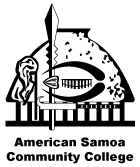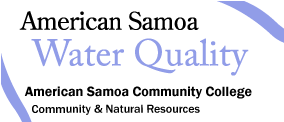 |
 |
|
| Who we are: American Samoa Community College |
 |
The American Samoa Community College was established in July 1970 as part of the AS Department of Education. Its mission is to provide post-secondary school educational opportunities in the liberal arts, teacher training, vocational/technical education, and general education to the residents of American Samoa. |
| In 1974 the college moved to its present location in the village of Malaeimi on Tutuila Island. It received semi-autonomous status in November 1992 and was given full control of its finances in October 1995. It offers about 200 courses to a student body of about 1000, leading to Associate of Arts and Associate of Science degrees as well as Certificate programs in a variety of academic and technical areas. |
|
 |
 |
 |
| ASCC Land Grant Program |
 |
| In 1980 the college became a Land Grant Institution when an amendment by Congress to the Morrill Act of 1862 allowed colleges in American Samoa and Micronesia eligibility for membership in the Land Grant system. |
|
| The following year a 10-acre experiment station adjacent to the campus was designated as the home of the Land Grant Program. Mr. Pemerika Tauili’ili, a former AS Director of Agriculture, was its first Director. The Center for Tropical Agricultural Research was dedicated in his honor in March 1996. Now known as the Department of Community and Natural Resources, a staff of about 50 serves in its Cooperative Extension, research, forestry, and instruction programs. |
 |
 |
 |
 |
The Regional Water Quality Coordination Program is part of the CSREES National Water Quality Program. |
| The Program is designed to make research, education and extension resources of the Land Grand Institutions more accessible to Federal, State and Local water quality improvements efforts. |
 |
 |
 |
| Program Objectives: |
 |
· |
Coordinate with existing Federal, State and Local water quality programs and identify linkages and partnerships to optimize efficient resources utilization |
| · |
Develop and share education outreach programs addressing critical water quality and water resources management issues. |
| · |
Promote the use of appropriate water resource management tools by professionals, agricultural producers, and communities in agriculturally impacted watersheds. |
|
|
|






